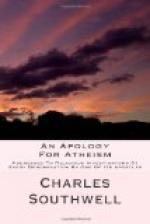’The best means to arrest the progress of the pestilence in the people’s food have occupied the attention of scientific men. The commission appointed by government, consisting of three of the most celebrated practical chemists, has published a preliminary report, in which several suggestions, rather than ascertained results, are communicated, by which the sound portions of the root may, it is hoped, be preserved from the epidemy, and possibly, the tainted be rendered innoxious, and even partially nutritious. Followed implicitly, their directions might mitigate the calamity. But the care, the diligence, the persevering industry which the various forms of process require, in order to effecting the purposes which might result if they were promptly adopted and properly carried out, are the very qualities in which the Irish peasantry are most deficient. In the present crisis, the people are more disposed to regard the extensive destruction of their crops in the light of an extraordinary visitation of Heaven, with which it is vain for human efforts to contend, than to employ counteracting or remedial applications. “Sure the Almighty sent the potato-plague, and we must bear it as well as we can!” is the remark of many; while, in other places, the copious sprinklings of holy water on the potato gardens, and on the produce, as it lies upon the surface, are more depended on for disinfecting the potatoes than the suggestions of science, which require the application of patient industry.’
Daniel O’Connell may continue to boast about Irish morale and Irish intellect—the handsome women, and stalwart men of his ’beloved country;’ but no sensible persons will pay the least attention to him. It is, at all events, too late in the day for we ‘Saxons’ to be either cajoled or amused by such nonsense. An overwhelming majority of the Irish people have been proved indolent beyond all parallel, and not much more provident than those unhappy savages who sell their beds in the morning, not being able to foresee they shall again require them at night. A want of forethought so remarkable, and indolence so abominable, as characterize the peasantry of Ireland, are results of their religious education. Does any one suppose the religion of that peasantry has little, if anything, to do with their political condition; or can it be believed they will be fit for, much less achieve political emancipation, while priests, and priests alone, are their instructors? We may rely upon it, that intellectual freedom is the natural and necessary precursor of political freedom. Education, said Lord Brougham, makes men easy to lead, but difficult to drive; easy to govern, but impossible to enslave. The Irish peasantry clamour for ‘Repeal,’ never considering that did they get it, no essential change would be made in their social, moral, or to say all in one word, political condition; they would still be the tool of O’Connell and other unprincipled political mountebanks—themselves the tool of priests.




